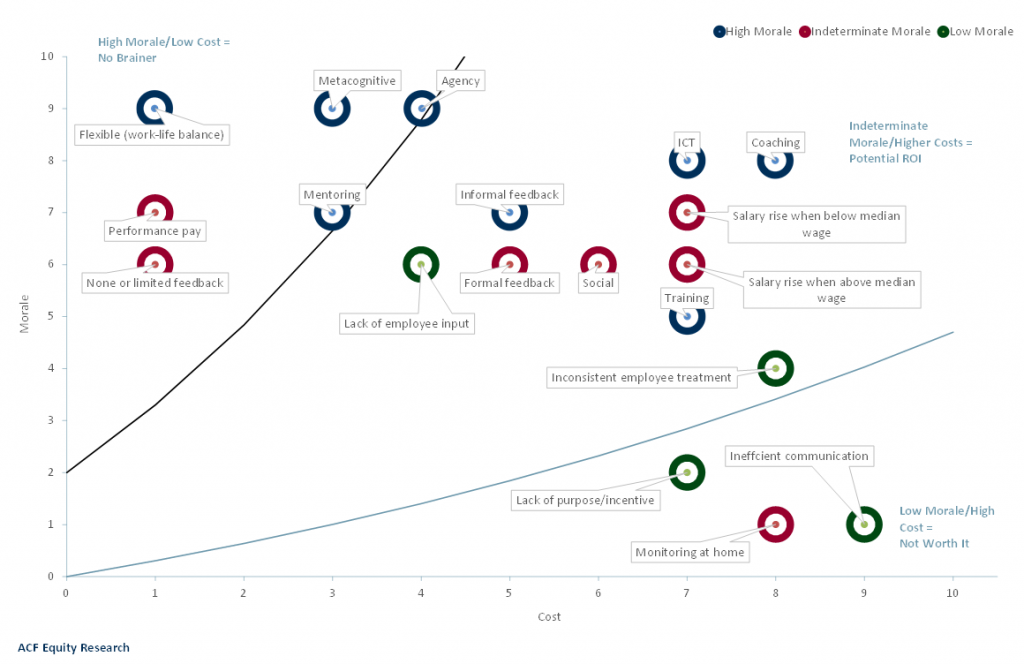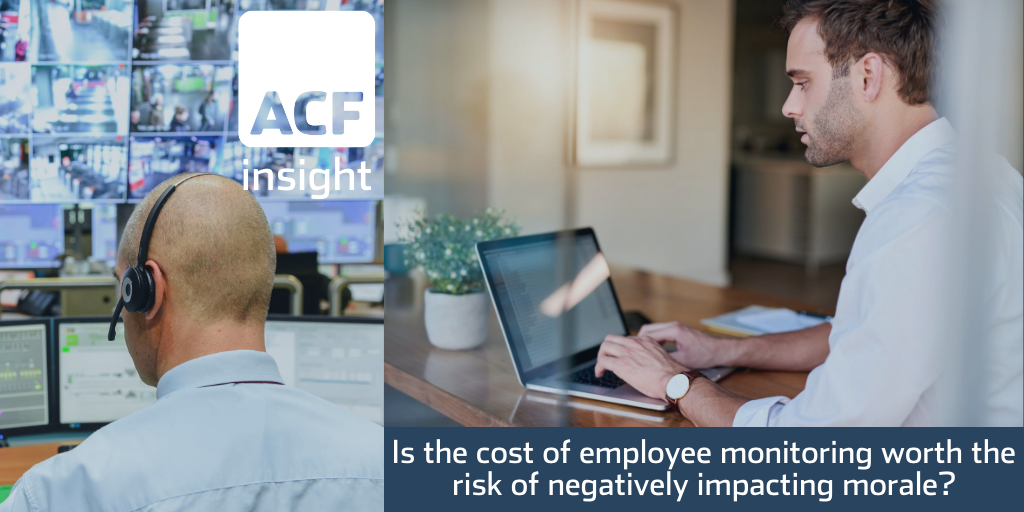Is the cost of monitoring employees at home worth the erosion of trust?
Venturebeat, a US tech website, raised potential concerns about the emergence of AI surveillance of employees at home. Employee monitoring from cameras to keyboard clicks is nothing new, but this is a potentially unwelcome extension. We think there is an implication for healthcare companies involved in the burgeoning mental healthcare segment.
Exhibit 1 The Cost of Morale

Is the cost of employee monitoring really worth the cost in morale? Our qualitative exhibit 1 attempts to examine whether typical business investments are worth the effort based on their impact on morale and trust. We examine the peculiarities of employee home monitoring below.
- Employee monitoring is not new. Frederick Taylor (an American mechanical engineer and one of the first management consultants) started ‘scientific management’ at the beginning of the 20th
- Taylor’s study determined the optimal way to perform a job – the application of Taylors findings continues today.
- A 2019 UC Berkeley report showed how algorithms were (and are) being used to regulate employee’s performance. This type of surveillance is used in factory/warehouse settings and construction sites.
- Monitoring systems also use facial recognition and can tell, or at least infer, when employees are not doing their job, are smoking or using their smartphones rather than working.
- A US survey in 2019 showed that more than 50% of 239 large corporations monitor their workforce using non-traditional techniques such as emails, social media messages, and biometric data.
- Due to Covid, many employees are working from home and employers are using ‘productivity management’ software to track their employees in the home environment.
- InterGuard, a US leader in employee monitoring software, booked 3-4x growth. The use of Sneek (an always on video monitoring tool) was up 10x.
- Employee monitoring is legal in the US thanks to the Electronic Communications Privacy Act of 1986, but now, issues are arising about monitoring people at home which has traditionally been a private space.
- We already have Amazon Alexa and Google Home that monitor speech in the home, but that is a neo-voluntary act, in so far as consumers can turn these devices off and unplug them without fear of losing their income.
- Turning a laptop into the eyes and ears of an employer is a newer development. The obvious use is for time, motion and work productivity verification i.e. are you doing what you are being paid to do and are you doing it efficiently on a per dollar basis. More interestingly, and less obviously, home collected data can be valuable to risk managers, credit issuers, and of course, security agencies.
ACF View:
- This issue is interesting and relevant for healthcare because as a result of a global pandemic the world has had to change how it carries out its business activities.
- Ensuring that employees are productive is key, cost effective and has important implications for valuation. But how far should or will employers go – is this an invasion of privacy that could create significant balance sheet liabilities that would outweigh any productivity gains?
- Companies also need to consider how this will affect employee trust (which underpins morale) and, in turn, the financial performance of companies.
- Every General knows morale is key to any fighting force and more enlightened companies recognise this too. The problem with morale is that it is difficult to quantify, though financial markets try by digesting various sentiment surveys.
- What we can say is that you know when morale is diminished – share prices tend to plummet and companies disappear. What we can also say is that for investors, once the market knows morale has gone it’s too late to act to protect capital.
- To protect employees and investors, governments will need to implement strict regulations around data collected and the appropriateness of its use, if this is to become the next normal.
- We consider other items that are perhaps unforeseen for now – home monitoring introduces a cost-to-play element to the employed that is new. Investing in your home to please your employer’s cameras (for want of a better turn of phrase).
- Insurers and credit providers may be interested in data on your work patterns or lack of them, but we think retailers and political party machines will also be very interested in subtle ‘taste and values’ data from home video capture information, which undoubtedly will be sold on or ‘leaked’ or hacked.
There is also a basic management signal to investors – if a management team does not know what employees are supposed to deliver or what they are doing…and can’t use an output measure for this, why exactly are investors trusting these company managers to grow or provide a return on investor capital. Perhaps an exchange of frank views is needed between investors and managers in such cases?
What we are pretty convinced about is that there will be a rise in mental health issues for employees who are monitored in their homes, that reads through to the rapidly growing mental health sub-sector of healthcare.
Authors: Renas Sidahmed and Christopher Nicholson – Renas is a Staff Analyst and part of the Sales & Strategy team and Christopher is a founding executive, MD and Head of Research at ACF Equity Research. See their profiles here













